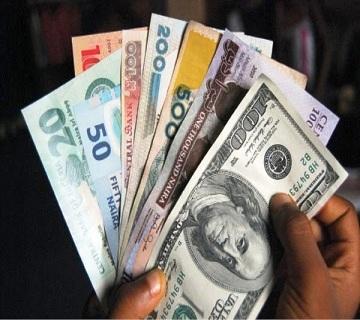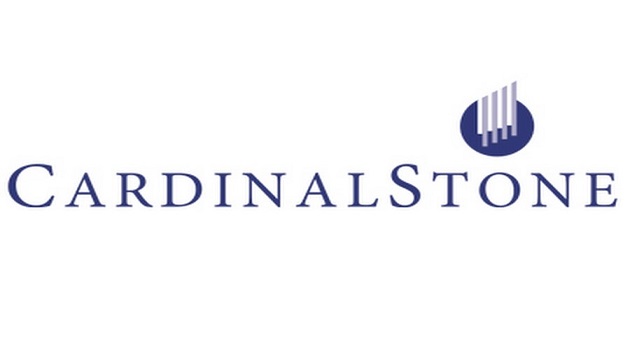E-Financial
Naira softens against Dollar on parallel markets

By Lukman Otunuga, Research Analyst at FXTM
The Naira eased slightly against the Dollar on the parallel markets as geopolitical concerns weighed on emerging market currencies.
Reports of Nigeria’s foreign exchange reserve falling by $2.1 billion in 30 days compounded downside pressures with the Naira trading around 360 against the Dollar. An appreciating Dollar, prospects of higher US interest rates, jitters ahead of the 2019 general elections and geopolitical tensions across the world present downside risks to the Naira. With the economic calendar in Nigeria relatively light for the rest of the trading week, the local currency is likely to be influenced by external forces.
Risk sentiment wanes on geopolitical concerns
Asian stock markets tumbled this morning following a lacklustre session on Wall Street overnight that saw the Dow Jones fall more than 100 points.
The incredible rally in Chinese equities yesterday clearly failed to jumpstart risk sentiment as geopolitical tensions weighed heavily on investor confidence. Global equity bulls seem to be entangled in a gruelling battle with ongoing US-China trade disputes, global growth concerns, geopolitical tensions and prospects of higher US interest rates. With the various geopolitical risk factors bubbling violently in the cauldron, all the ingredients for a market-shaking selloff across global stocks seem to be in place. All good things must come to an end and this could be the story for the bullish global equity markets.
Dollar gains on safe-haven demand
The Dollar remains a popular destination for safe-haven flows amid the mounting geopolitical tensions across the world.
Uncertainty over Brexit negotiations, the standoff over Italy’s budget and US-Saudi tensions have sent investors rushing to the Dollar. With the Greenback also supported by optimism over the US economy and prospects of higher US interest rates, the fundamental outlook points to further upside. In regards to the technical picture, the Dollar Index is bullish on the daily charts with prices trading near a two-week high above 96.10. A solid weekly close above 96.00 has the potential to trigger a move towards 96.20 and 96.48.
Commodity spotlight – Gold
Gold bulls hit the ground running this morning as geopolitical concerns promoted risk aversion and accelerated the flight to safety.
The yellow metal has scope to shine with intensity this week as the risk-off mood sends investors rushing to any form of safety. However, with the Dollar also benefiting from safe-haven flows there could be fierce competition between the two. Gold seems to be winning the battle of the safe-havens this morning with prices trading around $1,231 as of writing. A solid breakout and daily close above the $1,233.50 resistance level is likely to inject Gold bulls with enough inspiration to challenge $1,245.
Currency spotlight – GBPUSD
Brexit-related uncertainty remains the primary culprit behind Sterling’s weakness.
The clock is ticking with under six months left until the official Brexit deadline and the Irish border issue remains an unsolved puzzle. Investor attraction towards the Pound is likely to diminish as investors evaluate the possibility of a no-deal Brexit scenario. The GBPUSD is under pressure on the daily charts with a breakdown below 1.3000 opening a path towards 1.2930.
E-Financial
SERAP Gives CBN 48-Hour Ultimatum to Withdraw ATM Fee Hike

Socio-Economic Rights and Accountability Project (SERAP) has called on the Central Bank of Nigeria (CBN) to immediately revoke its recent increase in Automated Teller Machine (ATM) transaction fees, describing the move as “Patently unlawful, unfair, unreasonable, and unjust.”

In an open letter addressed to Olayemi Cardoso, governor, CBN, and dated February 15, 2025, SERAP warned that the fee hike would worsen economic hardship for millions of Nigerians, particularly those at the lower end of the financial spectrum.
The rights group gave the apex bank a 48-hour deadline to reverse the policy or face legal action.
The CBN’s new directive mandated that ATM withdrawals at off-site locations, such as shopping malls, airports, and standalone cash points, will attract an N100 charge per N20,000 withdrawal.
Additionally, a surcharge of up to N500 may apply for transactions conducted at certain locations. The new fees are set to take effect from March 1, 2025.
In its letter, signed by Kolawole Oluwadare, deputy director, SRERAP criticized the policy, arguing that it would disproportionately affect struggling Nigerians while benefiting commercial banks.
“The manifestly unfair increase in ATM transaction fees will hit hardest those at the bottom of the economy and exacerbate the growing poverty in the country,” SERAP stated.
The organization further argued that financial institutions should bear the cost of banking operations, rather than shifting the burden onto customers, particularly those with limited financial means.
SERAP accused the CBN of prioritizing the interests of banks over the welfare of ordinary Nigerians, many of whom already struggle with the high cost of living.
The group pointed out that banks continue to report record-breaking profits while imposing excessive charges on customers.
“CBN policies should not be skewed against poor Nigerians and heavily in favour of banks that continue to declare trillions of naira in profits, mostly at the expense of their customers.
“The increase in ATM transaction fees will inflict misery on Nigerians and contribute to human rights abuses,” the letter read.
SERAP also noted that the policy contradicts President Bola Tinubu’s commitment to tackling poverty in Nigeria.
The rights group argued that the CBN’s action violates multiple legal provisions, including the Nigerian Constitution, the CBN Act, and the Federal Competition and Consumer Protection Act.
SERAP highlighted specific sections of these laws that prohibit unfair business practices and protect consumers from exploitative charges.
According to SERAP, the increase in ATM fees discriminates against low-income Nigerians who may struggle to afford the higher fees, creates a two-tiered financial system that favours the wealthy, contradicts the CBN’s stated mission to promote national economic well-being, and violates international human rights obligations under the United Nations Guiding Principles on Business and Human Rights,
“The CBN has responsibilities under the UNGPs to take effective steps to avoid or mitigate potential human rights harm and to consider ending any charges or transaction fees where severe negative human rights consequences cannot be avoided or mitigated,” SERAP asserted.
“We would be grateful if the recommended measures are taken within 48 hours of the receipt and/or publication of this letter.
“If we have not heard from you by then, SERAP shall take all appropriate legal actions to compel you and the CBN to comply with our request in the public interest,” the letter warned.
E-Financial
FG Seeks Fresh $300m Loan from World Bank for Health Security

Federal government has engaged the World Bank for a fresh $300m loan to strengthen Nigeria’s health security infrastructure.

Information obtained from the World Bank showed that the loan, which is under consideration, will be implemented by the Nigeria Centre for Disease Control (NCDC) with the Federal Ministry of Finance acting as borrower on behalf of the Federal Government.
According to information on the World Bank website, the loan project is expected to “increase regional collaboration and health system capacities to prevent, detect, and respond to health emergencies in the Federal Republic of Nigeria.”
The project is currently in the pipeline stage, with the disclosure date scheduled for February 6, 2025.
The World Bank board is expected to give its approval on July 30, 2025, following necessary assessments. The appraisal is set for April 14, 2025, and implementation will commence in the 2026 fiscal year.
According to a document on the concept of environmental and social review, the Nigeria Health Security Programme aligns with broader government efforts to enhance disease surveillance, diagnostic capabilities, emergency response, and laboratory networks across the 36 states and the Federal Capital Territory.
The programme’s primary objective is to enhance regional collaboration and strengthen Nigeria’s health systems to deal with emergencies. It falls within the World Bank’s investment in health, nutrition, and population sectors across Western and Central Africa.
According to the Environmental and Social Review Summary of the project, HeSP will expand molecular laboratory capacity, upgrade primary healthcare centres, establish emergency operation centres, and construct warehouses.
It will also deploy mobile laboratories and install water, sanitation, and hygiene facilities alongside solar energy systems to support health infrastructure improvements.
Although the total project cost is yet to be determined, the World Bank has committed $300m to the initiative. The funds aim to bolster Nigeria’s pandemic preparedness and improve response mechanisms for public health threats.
The initiative comes as Nigeria strengthens its public health infrastructure following lessons from previous outbreaks, including COVID-19.
If approved, the loan will support the NCDC in improving disease surveillance, diagnostics, emergency response, and laboratory services.
Nigeria has previously secured funding from international financial institutions to boost healthcare resilience, including financing for vaccine procurement, emergency medical services, and infrastructure development.
However, the project, categorised as a high-priority public health intervention, carries substantial environmental and social risks due to potential health, safety, and ecological concerns associated with infrastructure expansion.
Identified risks include increased medical waste, occupational hazards, and heightened energy and water demands.
Social risks range from potential grievances from stakeholders to concerns over land acquisition and implementing health interventions in conflict-prone areas.
E-Financial
CardinalStone Acquires Radix Pension Managers

Multi-asset management firm CardinalStone Partners Limited has announced the successful acquisition of a majority equity stake in Radix Pension Managers Limited.

Following this acquisition, Radix Pension Managers Limited has been rebranded as CardinalStone Pensions Limited, a statement from the firm read over the weekend.
CardinalStone Partners Limited thus solidifies its position as a key player in Nigeria’s financial landscape, leveraging its expertise and resources to enhance CardinalStone Pensions’ operations and service delivery. This transition represents a significant milestone in the firm’s strategic expansion in the pension industry.
CardinalStone Partners Limited, renowned for its comprehensive financial services catering to institutional and high-net-worth clients, boasts a team of seasoned investment professionals with a proven track record of visionary leadership.
On the acquisition, the Group Managing Director of CardinalStone, Michael Nzewi, said, “Our collective strength provides us with the pivotal opportunity to strengthen our position in the pension industry and broaden our range of services for our valued clients.
“By integrating the expertise and resources of all businesses in the CardinalStone Group, we are poised to deliver even greater value and innovative solutions to our customers across the board.”
Despite the change in ownership and brand identity, there will be no disruption to the operations of CardinalStone Pensions.
The firm will continue its business operations as a Pension Fund Administrator, the statement further highlighted.

 News3 days ago
News3 days agoTikTok Returns on Apple, Google US App Stores as Trump Delays Ban

 General News3 days ago
General News3 days agoResearchers Develop Innovative Treatment for Malaria

 E-Financial3 days ago
E-Financial3 days agoAfrican Union Launches Credit Rating Agency to Promote Regional Economic Integration

 General News3 days ago
General News3 days agoNigeria to Host ICEGOV 2025, A Milestone in Digital Governance and Global Leadership

 Broadcasting3 days ago
Broadcasting3 days agoFG Kickstarts Construction of Emerging Technologies Institute in Kano

 Telecom3 days ago
Telecom3 days agoVisa Launches Report on Digital Payment Landscape in Nigeria, Shows Positive Outlook

 General News3 days ago
General News3 days agoMTN Nigeria Foundation Supports Education with Donation of School Supplies to 1000+ Students

 Broadcasting3 days ago
Broadcasting3 days agoFamily Marks one-year Memorial of Late APC Chieftain, Ojougboh with Charity Outreach























